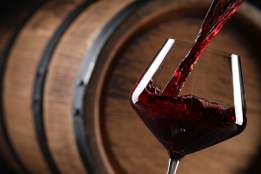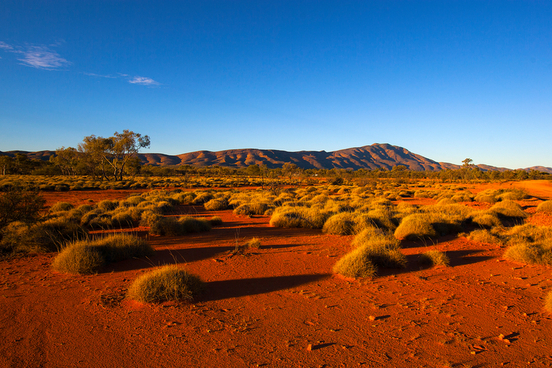
Outback
When most people think of Australia, one of the first words that comes to mind is outback. The outback is the vast (usually arid) interior and rural part of Australia. But outback as a word had its origins in the U.S.
The word was first used in the mid-1800s pretty literally: it was first used an adverb to refer to the space behind a house or a building, and especially the back yard of a house. The Aussies wittily borrowed this sense of out back to refer to the remote interior parts of their enormous continent:
Grass will be abundant out back.
— Wagga Wagga Advertiser, 17 Apr. 1869
By the end of the 19th century, the adverb had become the noun outback, and its generic "backyard" use dwindled as outback became more and more identified with the Australian interior.
Wait—isn't the vast and arid interior region of Australia actually called the bush? Not quite. The bush generally refers to areas of vegetated wilderness that are not as remote as the outback is. So while a person living in Sydney may spend their weekend hiking (or bushwalking) in the bush that lies just outside the city, they wouldn't take a weekend to go wander around the outback. (There is, however, an uptick in what's called "outback tourism," so even the outback is getting closer and closer to the city.)
The "Outback Steakhouse" chain restaurant is, incidentally, not Australian. It originated in Florida.

Bonzer
Ask an Aussie to name a truly Australian word, and they might yell "Bonzer!" Bonzer, sometimes also spelled bonza, means "first-rate" or "excellent," and it is the Australian equivalent of the American "awesome":
"It's a good clean game ... and the standard is red hot," Thies said. "They're bonzer chaps; no arguing or fighting."
— Graeme Thies, quoted in Bendigo Advertiser, 13 April 2016
It's even common enough slang that it shows up in headlines ("Not Bonzer, but bronze OK"—Herald Sun story about Australia's standings in the Summer Olympics, 9 Aug. 2016). It can be an adjective ("bonzer chaps"), a noun ("the game was a real bonzer"), an adverb ("the beer went down real bonzer"), and, of course, an interjection of agreement or pleasure ("Bonzer!"). As versatile as bonzer is, it looks like we hit peak bonzer in the middle of the 20th century, and written use has been declining since.
So where did bonzer come from? No one is exactly sure. It's slang, which means that it was likely in spoken use long before it showed up in writing. Our earliest written evidence for it right now is from the early 1900s, though that's liable to change. A number of etymologies have been proposed for it. One theory that has been thoroughly discredited is that bonzer is an adaptation of two Chinese words that mean "good gold." Two other theories, each with their lexicographical supporters, tie bonzer to the French bon, meaning "good," or the English bonanza, referring first to a large and rich mineral deposit, and then later to anything that was valuable or rewarding. (One Australian dictionary favors the French etymology; the OED and our own dictionaries favor the English one.)
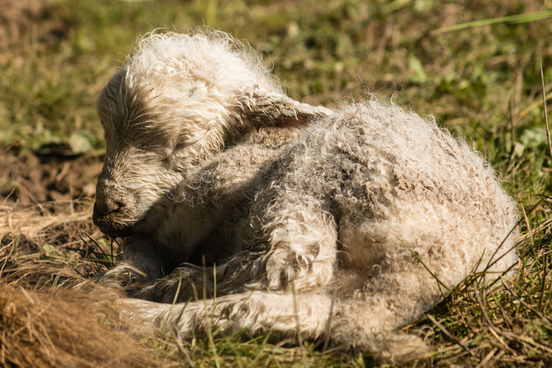
Dag
Australia has quite a bit of ranch land, and a list of the country's top 20 exports makes that clear. In that list, you'll find lamb, mutton, and wool. There are approximately 71 million sheep in Australia currently ; compare that to Australia's current population, and there are about three sheep for every person living on the continent.
It's not a surprise that some wool-industry terms have made it into Australian slang, and one colorful member of this genus is dag. A dag, sometimes also called a daglock, is a piece of wool on the hindquarters of a sheep that's covered in dirt and (ahem) dried excreta. Those dags are not able to be processed when the fleece is sent out for washing and spinning, and so when sheep are sheared, a worker known as a dag-picker would help clean up the fleece for production by cutting or pulling off the section of the fleece full of dags. The word dag itself goes back to the 14th century, and was initially used to refer to a pointed pendant.
The sheepy dag gave rise to a number of different uses in Australian English, and none of them as scatological as you'd think. Dag appears in the phrase rattle your dags, which means "hurry up" and describes exactly what happens to those dried dags when a sheep starts to jog. There's the specialized verb dag, which according to one Australian dictionary refers to following a jockey around looking for information about a horse race. (A tip-hungry better tailing a jockey mimics the closeness of a dag to a sheep.) There's the adjective daggy, which means "unkempt, scruffy," and which is a bit deprecatory, but could be worse considering it's a close cousin of dag. And then there's the broader noun dag which refers to either an odd, amusing, or eccentric person, or (sometimes disparagingly) to an untidy, slovenly, or unpopular person. Both stem directly from the sheep-related dag, and both are considered to be "affectionate insults." Dag is so much a part of Australian language and culture that it's even mentioned on an Australian government webpage highlighting Aussie slang.
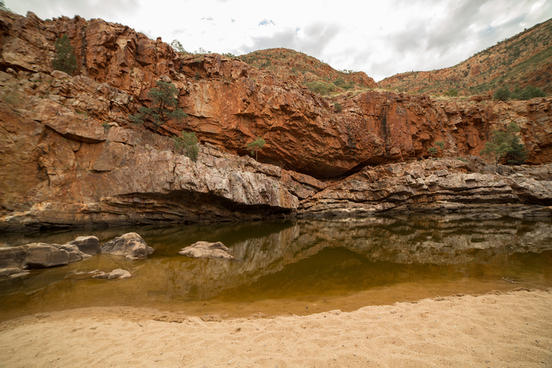
Billabong
Once a jolly swagman camped by a billabong
Under the shade of a coolibah tree,
He sang as he watched and waited 'til his billy boiled
"You'll come a-Waltzing Matilda, with me"
This is likely where you know the word billabong from (unless you are a surfer and you know it as a tradename): the song "Waltzing Matilda," whose lyrics were written by Banjo Paterson while he was visiting the Dagworth Station (or ranch), which was in the remote northwestern quadrant of Queensland. It's considered one of the first "bush ballads," about the life of a swagman (or vagrant) in the bush, and it's often seen as the unofficial national anthem of Australia.
It's also a treasure trove of Australian bush talk: the aforementioned swagman, coolibah, and billabong. The latter two words, coolibah and billabong were borrowed into English from two indigenous languages: coolibah, which refers to a particular gum tree, was borrowed from a dialect of Gamilaraay, and billabong, which can refer to a blind channel that leads out of a river, or the pool that forms from such a channel (sometimes called a backwater), or a dry riverbed that fills seasonally, was borrowed from Wiradhuri. The Wiradhuri word billabaŋ means "a watercourse that only runs after rain."
According to Ethnologue, which catalogs the world's languages, there are 216 living languages in Australia, and 207 of those languages are indigenous. It goes on to say:
Furthermore, 6 are institutional, 23 are developing, 14 are vigorous, 35 are in trouble, and 138 are dying.
The dying languages are all indigenous languages: Wiradhuri and Gamilaraay are classified by Ethnologue as "nearly extinct." As of the 2006 census, there were only 100 native speakers of Wiradhuri left, and 35 Gamilaraay speakers.

Walkabout
Though there's been significant tension between white settlers of Australia and the indigenous Aboriginal peoples, the cultures cannot help but rub up against one another. That is what has given us the word walkabout.
When walkabout first appeared in print, it was used primarily by white settlers to describe an indigenous activity. One early citation gives us a sense of how the walkabout was perceived:
The 'Walk-about' is perhaps, in its ultimate results, one of the most important institutions in vogue among the aboriginals, and yet one on account of which their white brethren will, as often as not, hold them up to ridicule and contempt. To the settlers it is considered in the light of an excuse for a holiday or for shirking the work upon which the blacks would otherwise be employed.
— Walter E. Roth, Ethnological Studies Among the North-west-central Queensland Aborigines, 1897
The walkabout that is an "important institution" as well as fodder for ridicule and contempt is a foot journey into the bush that's taken by an Aborigine in order to live for a period of time in a way that is traditional to indigenous culture. Early citations make it clear that white Australians generally viewed walkabout as unproductive at best, and lazy vagrancy at worst: in fact, the word walkabout had an earlier meaning that has mostly fallen out of use and that referred to a vagrant.
The word quickly gained extended meanings that didn't have anything to do with the Aborigines. Walkabout came to refer to any public walk, such as (and particularly) one taken by visiting royalty. And the sudden disappearance of an Aborigine who has gone on walkabout, apparently without explanation, led to the word walkabout gaining an additional use that's fairly common in Australia today. Go walkabout can be used to refer to someone deliberately leaving a place for any one of a number of reasons, such as going on holiday or getting a cup of coffee ("Where's Joe?" "Gone walkabout."). Go walkabout is also a synonym of go missing and is used of everything from missing persons to missing car keys.
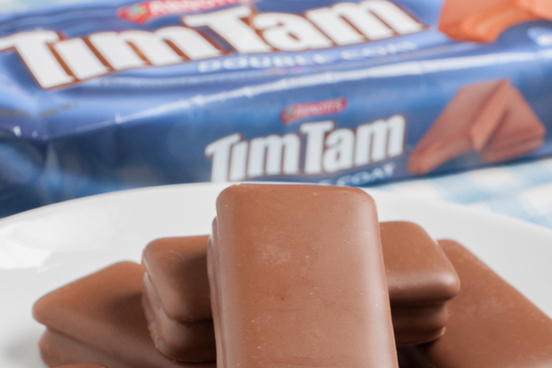
Bikkie
There aren't many Australian offices without a pack of bikkies lying around for workers to have with their afternoon cuppa.
— Bonnie Sutherland, Canberra Times, 18 Oct. 2016
Everyone loves slang, but there's a particular formula that lots of Australian slang follows: clipping and alteration. Clipping is the process of shortening a word usually to create a more informal version of that word—the slangy obvi from obviously is a good example. And alteration is just that: you somehow change the word to suit. In the case of Australian slang, words are clipped, and then a diminutive suffix is added to the clipped word. In this case, bikkie (the colloquial Australian word for a cookie), is clipped slang for biscuit (the British English word for a type of cookie), and it uses the -ie diminutive suffix.
Australian English is full of words based on this formula. Barbie, of the now-infamous "throw another shrimp on the barbie," is short for barbecue; brekkie is short for breakfast; mozzie is short for mosquito; postie is short for postman; Aussie is short for Australian; and the list goes on. Diminutive suffixes aren't just limited to -ie, either: the word aggro, another colloquialism, is a clipping of aggressive with the diminutive -o tacked on the end, for instance.
Bikkies, which is also spelled bickies, also appears in the colloquial phrase big bikkies, which refers to a lot of cash, as in "It costs big bikkies."

Anzac
There's one particular kind of bikkie that's common in Australia and has made its way to the northern hemisphere: the Anzac biscuit. A tasty riff on the oatmeal cookie, the Anzac biscuit is made with rolled oats, golden syrup, and usually unsweetened dessicated coconut, and it is the unofficial bikkie of Australia. (Tim Tam enthusiasts are welcome to challenge that statement by sending boxes of Tim Tams to us for research purposes.)
The name for the cookie, Anzac, has a less-than-whimsical history. When the word first appeared in the 1910s, it was in military communiques and war news. Anzac is an acronym that stands for "Australian and New Zealand Army Corps," a corps that formed in 1914 for the First World War and became renown for its role in the Gallipoli Campaign, in which Allied Forces landed on the Gallipoli Peninsula in the Ottoman Empire with the intention of taking Constantinople. The Anzac forces made up part of the ground war in Gallipoli, and soldiers endured hard fighting and terrible trench conditions before the campaign ended with the Allied retreat in 1916. Between 64,000 and 67,000 Australians and Kiwis fought at Gallipoli; more than half of them were killed or wounded in battle, and scores more fell ill with typhoid and dysentery from unsanitary trench conditions.
Gallipoli became an event that was crucial to testing the nationhood and national character of Australia and New Zealand—it came just 14 years after Australia ceased to be a collection of independent counties and became one united nation. Anzac Day is celebrated in both countries as a national holiday on the anniversary of the landing at Gallipoli (April 25); soldiers from Australia and New Zealand, and particularly ones who saw duty during either of the World Wars, are known as Anzacs; there is the Anzac spirit of endurance, courage, ingenuity, and fraternity. And, of course, there's the Anzac bikkie, an oat cookie that has been associated with the Australian war effort since at least 1921. (There's been much debate about whether Anzac biscuits were sent to soldiers in Gallipoli; some evidence suggests that the soldiers were given hardtack, which didn't have oats in it, and that the oaten cookies were more frequently called soldier biscuits.)
